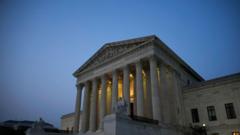As the Supreme Court hears arguments regarding President Trump's order to eliminate birthright citizenship, legal experts debate its constitutionality, the potential impact on affected children, and the broader implications for executive power in immigration policy.
Supreme Court Reviews Trump's Challenge to Birthright Citizenship

Supreme Court Reviews Trump's Challenge to Birthright Citizenship
The US Supreme Court is deliberating on President Trump's executive order aimed at ending birthright citizenship, a move that could reshape immigration policies across the country.
The US Supreme Court is currently evaluating the legality of President Trump's executive order that intends to abolish birthright citizenship, a significant move that could transform the country's immigration framework. This proceeding arises from Trump's insistence that children born in the U.S. to undocumented immigrants should not automatically receive citizenship, a stance he formalized through an executive order shortly after his return to the White House in January.
The case presents a pivotal question regarding the power of lower courts to issue nationwide injunctions against presidential orders. Trump's administration has faced considerable legal resistance, with several federal judges ruling against the executive order and prohibiting its implementation, calling into question the authority of the judiciary to impose such sweeping restrictions.
Legal scholars assert that while the current case unfolds, the foundation of birthright citizenship, guaranteed by the 14th Amendment, remains solidly intact. The Amendment specifies that "all persons born or naturalised in the United States, and subject to the jurisdiction thereof, are citizens." Trump's interpretation suggests that children of undocumented immigrants or temporary residents do not qualify for citizenship. However, critics warn that a ruling in Trump's favor would not only bypass congressional oversight but also mark a substantial shift in executive power, allowing the president to pursue other controversial policies with similar exemptions.
The plaintiffs in this case include immigration advocates and 22 US states, and they argue that ending birthright citizenship could produce profound societal consequences. With nearly 40 injunctions issued against various executive actions during Trump's presidency, the administration contends that such legal maneuvers undermine Trump's capacity to advance his policy agenda.
The implications of the Supreme Court's ruling could resonate beyond legal circles, affecting the citizenship status of countless children born in the U.S. Affected individuals might face the threat of denationalization, leading to circumstances that could render them stateless, as there is no guarantee their countries of origin would accept them back. Legal experts like Alex Cuic highlight that the removal of birthright citizenship could lead to a generation of American-born children facing second-class status within the country, further complicating the already contentious discourse surrounding immigration.
As the Court debates this landmark issue, the nation watches closely, anticipating a ruling that may redefine the contours of citizenship and executive authority in America.




















